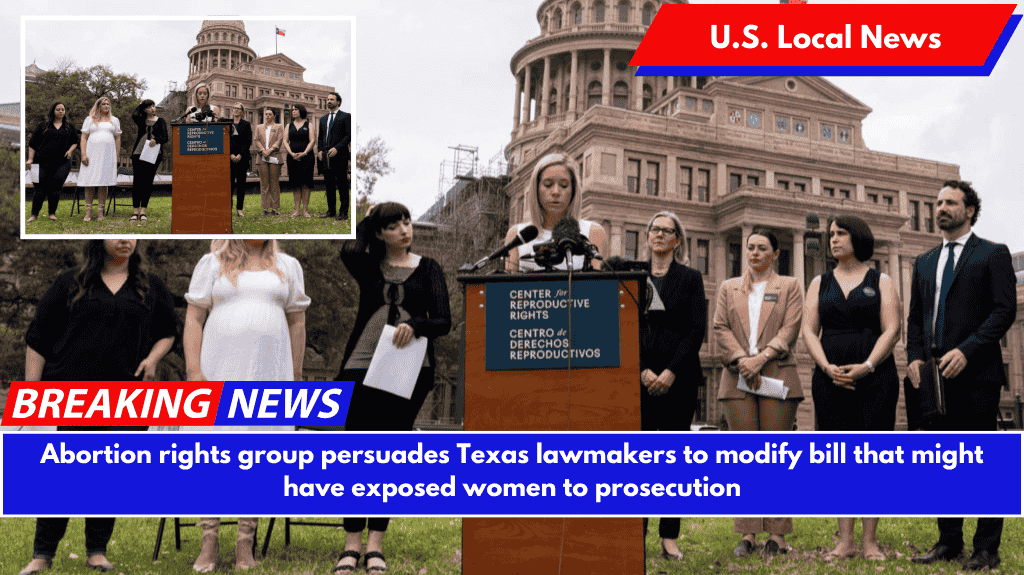AUSTIN – Following intense lobbying by abortion rights advocates, Texas lawmakers appear to be closing a loophole in a bill aimed at clarifying when doctors can legally perform abortions.
Critics argue that this loophole could have allowed authorities to prosecute women who obtain abortions out of state, as well as anyone who assists them in doing so.
During a press conference on Tuesday, members of the Free & Just group stated that the Republican lawmakers behind the proposal agreed to amend it so that it could not be used to prosecute pregnant women.
The organization is made up of plaintiffs in the Zurawski v. Texas case, in which women who had severe pregnancy complications sued Texas for clarification on when abortions are legal under state law.
“We are cautiously optimistic that once we see the language, and hopefully when it passes, that this is a step in the right direction,” Texas abortion advocate Kaitlyn Kash said at a press conference in Austin on Tuesday. “We still have a long way to go to ensure that what happened to me and my family and my friends and their families does not continue to happen.”
Kash, who was forced to carry her dead fetus for weeks as a result of Texas’ abortion ban, is one of dozens of women who claim the law has prevented them from receiving necessary medical care.
Under Texas’ current abortion ban, doctors may only perform the procedure if the patient’s life is in danger. However, critics argue that the law’s wording is purposefully vague, causing doctors to fear imprisonment, massive fines, and the loss of their medical license. So far, at least three Texas women have died as a result of the chaos.
Senate Bill 31, authored by Republican state Sen. Bryan Hughes, an anti-abortion crusader from East Texas, purportedly sought to clarify language in the Texas abortion ban to help medical professionals better understand when the procedure can be performed without subjecting them to criminal charges.
However, critics, including Free & Just, warned that the language in SB 31 and its companion bill, House Resolution 44, could resurrect Texas’ 1925 abortion ban, which allows women who receive an abortion outside of the state to face criminal charges.
“From their very public actions over the last three years, we simply cannot trust that state actors will not use that opening to criminalize us and our families for the health care choices that are best for us,” plaintiffs in Zurawski v. Texas wrote in an April 11 letter to legislators.
After lobbying lawmakers on Tuesday, Kash and other plaintiffs told reporters that their concerns were heard — at least this time. She attributed their lobbying success to media coverage of the effects of Texas’s abortion ban.
“To be quite honest, people don’t want to see women dying, and so unfortunately, it took stories like Amanda [Zurawski’s] and the women that passed away to have an impact,” she told me.
Zurawski, who attended Tuesday’s press conference, experienced septic shock twice and was left with a permanently closed fallopian tube after doctors refused to perform an abortion on her fetus.
The fetus experienced a preterm pre-labor membrane rupture, but because it had a detectable heartbeat, doctors were concerned about being charged criminally.
“I am encouraged today,” Zurawski stated. “I was terrified as I fought for my life in the hospital for three days.
My family was terrified, and the thought of a family going through what we did having to worry about going to jail on top of potentially losing their child, wife, or daughter is absolutely terrifying.
Although Tuesday appeared to be a victory for Texas abortion rights advocates, Free & Just members warned that there is still much work to be done — and many dystopian bills to oppose.
For example, Rep. Jeff Leach, R-Plano, introduced House Bill 5510, which would allow the state to prosecute online abortion pill providers and shut down websites that share abortion medication information. The House State Affairs Committee is scheduled to hear the proposal on Friday.
Meanwhile, Hughes authored Senate Bill 1976, which would allow the state to test wastewater quarterly for chemicals from abortion pills.
“What every Texan needs to know is that your vote really matters, and we need to be voting for people who fight for safe pregnancies in Texas,” said Melanie Rummel, another Texas woman who had to seek an out-of-state abortion due to pregnancy complications. “No matter what someone believes personally, we have to fight for abortion access because it is essential healthcare.”











